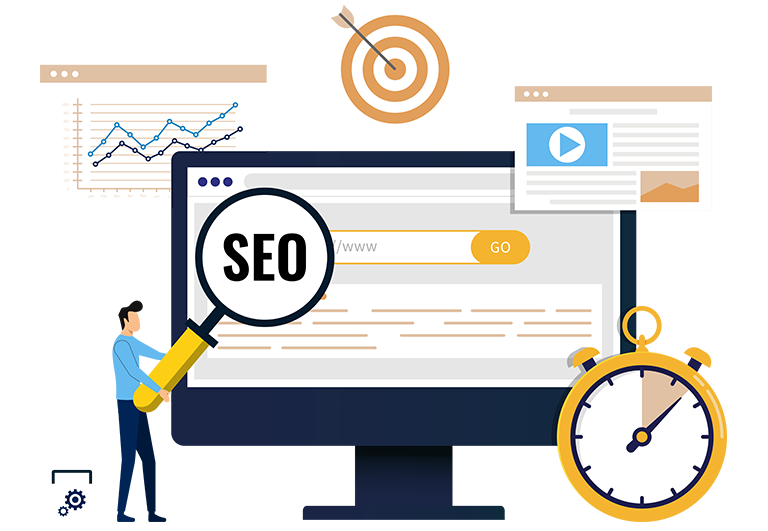SEARCH ENGINE OPTIMIZATION Vs. SEM: Recognizing the Key Differences
On the planet of electronic advertising, 2 important strategies that commonly show up are SEO and SEM. While they might appear comparable, they in fact serve different purposes and have distinctive approaches. SEO, which stands for Search Engine Optimization, concentrates on enhancing a website's visibility and organic ranking on online search engine results web pages. On the various other hand, SEM, or Online Search Engine Marketing, involves paid marketing to enhance a site's exposure on internet search engine. Recognizing the vital differences in between SEO and SEM is vital for services aiming to enhance their on the internet existence and drive web traffic to their sites. In this post, we will dig right into the interpretations, objectives, and essential components of both SEO and SEM, clarifying their one-of-a-kind characteristics and advantages.

Definition of SEO
SEARCH ENGINE OPTIMIZATION, or Look Engine Optimization, describes the technique of enhancing internet sites to boost their exposure and positions on search engine results pages (SERPs) It includes numerous strategies and approaches focused on enhancing natural, or non-paid, web traffic to a web site. The supreme objective of search engine optimization is to boost a website's on the internet existence and attract more targeted site visitors.
One of the key facets of search engine optimization is keyword optimization (https://easterntribunal.com/news/linkdaddy-announces-agency-backlink-local-business-directory-listings-service/458323). When looking for details or items related to a certain web site, this entails conducting thorough research study to determine appropriate key phrases that customers are likely to search for. By including these keyword phrases purposefully into the internet site's material, meta tags, and URLs, search engine optimization aims to improve the site's importance and ranking for those certain search terms
One more crucial consider SEO is on-page optimization. This includes optimizing numerous aspects on a web site, such as title tags, headings, images, and interior links, to make them more search engine-friendly (seo audit). By making sure that these components are correctly structured and pertinent to the website's content, search engine optimization helps online search engine recognize the context and relevance of the site
Additionally, SEO additionally includes off-page optimization methods, such as web link structure. This involves obtaining premium back links from various other reputable sites, which shows to internet search engine that the site is credible and authoritative. By building a strong network of backlinks, SEO enhances a web site's credibility and increases its possibilities of ranking higher in search results page.
Definition of SEM
SEM, or Internet Search Engine Marketing, is an advertising approach that entails promoting websites and raising their presence through paid marketing on internet search engine results web pages (SERPs) Unlike search engine optimization, which concentrates on enhancing sites to boost natural search positions, SEM makes use of paid marketing to drive traffic to a website.
One of the essential parts of SEM is pay-per-click (PPC) marketing. When an individual searches for those keyword phrases, the ads show up at the top or side of the search results.

SEM also consists of other forms of paid advertising and marketing, such as screen ads, remarketing ads, and purchasing advertisements. Display advertisements are banners or visual advertisements that show up on web sites within the Google Display Network. Remarketing advertisements target individuals that have previously visited an internet site, serving them advertisements as they search various other sites. Purchasing ads, on the other hand, advertise details items and show relevant info, such as price and availability.
Objectives of SEO and SEM
The goals of both search engine optimization (SEO) and search engine marketing (SEM) focus on enhancing a site's visibility and driving targeted web traffic. Nonetheless, the approaches and techniques employed by each differ significantly.
The major objective of SEO is to improve a website's organic search ranking on internet search engine results web pages (SERPs) This is attained by optimizing different aspects on the web site, such as web content, meta tags, and website structure, to make it a lot more appealing and relevant to internet search engine. By doing so, search engine optimization intends to bring in even more natural web traffic from customers actively looking for related keywords or subjects.
On the various other hand, SEM concentrates on raising a website's visibility via paid marketing on online search engine. The main goal of SEM is to drive targeted traffic to a website by bidding on key phrases and showing ads in online search engine results. This approach allows businesses to get to a broader audience quickly and successfully.

Trick Components of SEO
To efficiently carry out search engine optimization, it is vital to understand the key components that add to improving a website's organic search ranking. These components can be broadly categorized into off-page elements and on-page elements.
On-page elements refer to the elements that are straight present on a website and can be optimized for better online search engine exposure. This includes the website's content, key words usage, meta tags, link framework, web page titles, and headings. By optimizing these components, internet search engine can much better understand the relevance and context of the website's web content, leading to higher positions.
Off-page aspects, on the various other hand, concentrate on exterior signals that affect an internet site's authority and trustworthiness. This includes backlinks from various other reliable internet sites, social media sites signals, and on-line points out (https://tech.malaysiantalks.com/news/linkdaddy-announces-agency-backlink-local-business-directory-listings-service/458323). The more high-quality and relevant back links a website has, the far better its chances of rating greater in online search engine results pages
In addition, user experience is a crucial component of SEO. Linkdaddy. Internet search engine prioritize sites that offer a favorable individual experience, consisting of rapid filling times, mobile-friendliness, and easy navigation
Trick Components of SEM
As opposed to SEO, SEM incorporates an unique set of vital components that concentrate on paid advertising and driving immediate presence in internet search engine results. These components consist of online search engine advertising, additionally understood as pay-per-click (PPC) marketing, keyword research, ad production, and campaign monitoring.
Browse engine advertising is a crucial element of SEM. It involves bidding process on key phrases relevant to your organization and producing text or screen ads that will certainly show up in online search engine results when those key words are looked. With internet search engine marketing, you can target details demographics, locations, and even time of day to reach your wanted target market.
Keyword research is an additional vital element of SEM. It entails identifying the key phrases that your target market is using to browse for solutions or items comparable to yours. By carrying out extensive keyword study, you can optimize your advertisements and guarantee they are shown to the appropriate people at the best time.
Advertisement creation is the process of developing convincing and engaging advertisements that will certainly entice users to click on them. Well-crafted ads have a strong call-to-action, relevant messaging, and a clear value recommendation.
Last but not least, project monitoring involves monitoring and optimizing your SEM campaigns to guarantee they are carrying out efficiently. This consists of tracking metrics such as click-through rates, conversion prices, and return on investment (ROI) to make data-driven decisions and attain the ideal outcomes.
Conclusion
SEO focuses on optimizing websites to improve organic search rankings, while SEM involves paid advertising to increase visibility on search engine results web pages. Recognizing the distinctions in between Search engine optimization and SEM is vital for services to establish a detailed online advertising and marketing approach.
SEARCH ENGINE OPTIMIZATION, which stands for Look Engine Optimization, concentrates on enhancing a site's visibility and natural position on search engine results pages. On the other hand, SEM, or Search Engine Advertising and marketing, entails paid marketing to enhance a web site's visibility on search engines (seo optimization).SEO, or Search Engine Optimization, refers to the technique of enhancing sites to boost their exposure and rankings on search engine results web pages (SERPs)The primary goal of Search engine optimization is to improve an internet site's natural search ranking on search engine results web Click Here pages (SERPs) SEO concentrates on enhancing websites to boost organic search positions, while SEM includes paid advertising to boost visibility on search engine results pages